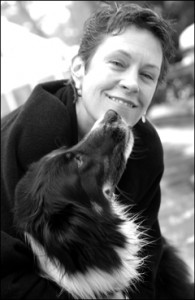The Opposite of Television
This evening I went to a poetry reading by Chase Twitchell at Smith College in Northampton, and boy was that a good time.
A poetry reading is the exact opposite of television. Television spoon feeds you every lurid, graphic detail while you sit in a passive stupor.
And if you didn’t get the simplistic message, don’t worry; it will be hammered home like two guys pounding on a railroad spike.
See? I’ve already learned to wax poetic and I’ve applied for my poetic license. I’m getting sick of all these prosaic limitations. Right now I just have my learner’s permit, but I’m having a great time.
At a poetry reading, your mind is active, filling in the gaps between the stepping stones the poet has left for you, conjuring up images from unexplored regions of your imagination, dancing nimbly about the cosmos like a spirit freed from bondage.
Television deadens. Poetry enlivens.
A lot of people point to poetry and say they don’t understand it. In my opinion, that’s not the point. What is understanding anyway?
“Father, what is that flaming orb in the sky?”
“Why son, that’s Apollo’s fiery chariot.”
“Oh.”
When you think about it, the very idea of human understanding is preposterous — a contradiction in terms. How can a blob of protoplasm understand the universe that brought it to life and continues to sustain it?
I have observed that the greatest impediment to learning is thinking that you know, and the greatest impediment to wisdom is seeking to understand, to pigeonhole and classify your observations so they fit your preconceptions.
I think a fixation on understanding diminishes our capacity for wonder and delight.
Listening to Chase Twitchell’s poetry, I felt like I was eight years old, sitting with a friend by a mountain stream, throwing rocks in the water and asking each other what life is all about.
Who needs to understand when we can dance nimbly about the cosmos like a spirit freed from bondage?


March 3, 2010 @ 12:50 am
Had to leave a comment because I am one of those who look at poetry and say I don’t understand. Will try to get out of that.